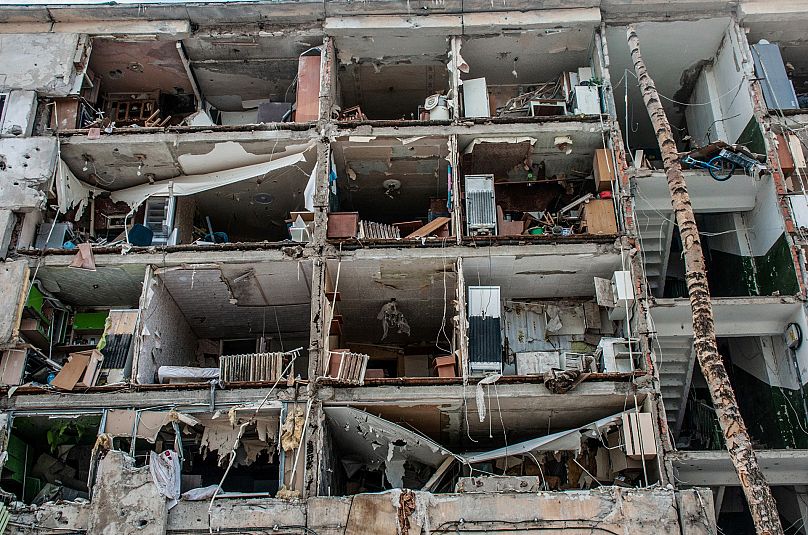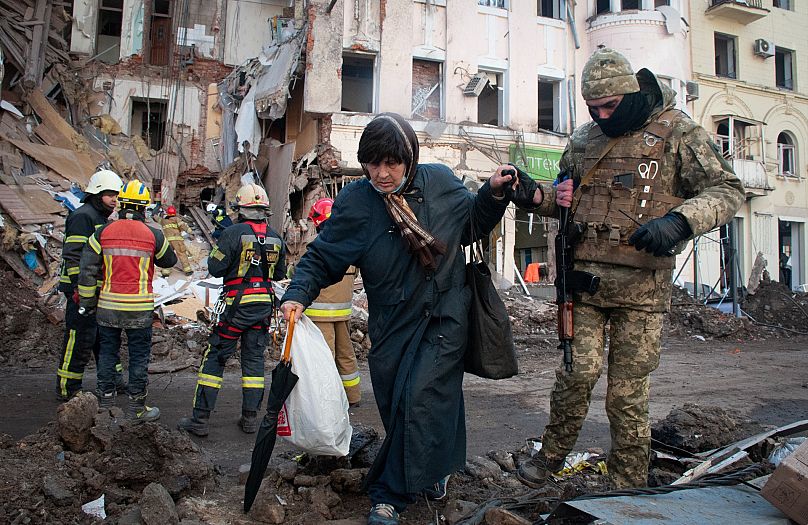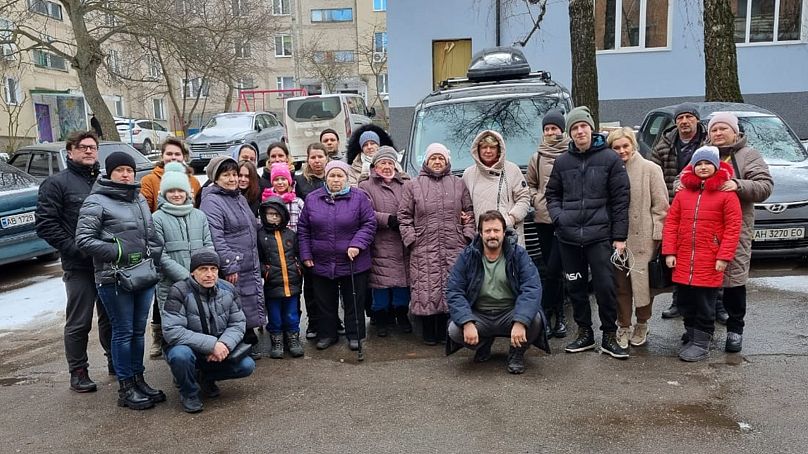“To me, he’s a hero.” Alberto, 58, rescued 38 people from Ukraine, 20 of whom he is hosting at his home in Vienna.
It was a blunt and desperate message from his mother-in-law in Ukraine that convinced Alberto, 58, he had to act quickly.
"I am already dead," she told him on the phone from Kharkiv. "I don’t understand why you insist on calling me. Don’t call me anymore."
Alberto, an Italian living in Vienna with his Ukrainian wife Svetlana, said from that moment she stopped picking up the phone.
“I went to rescue my wife’s family from a tomb,” the former policeman told Euronews. “I told [myself] that if we don’t go there to get them, we will never see them again.”
'The bomber shelter was more like a cellar'
Kharkiv, Ukraine's second-biggest city and near the border with Russia, was one of the first areas to come under bombardment.
It is also among the cities hardest hit.
The regional emergency service said on Wednesday that at least 500 residents of the city have been killed since the start of Russia's invasion on 24 February.
Barely days into the conflict, civilian areas were already being targeted.
Its residents were spending days trapped inside bunkers, lacking immediate access to food, water and medical provisions.
“The bomb shelter wasn’t really a bunker, but like a cellar,” Svetlana’s cousin, Alina, told Euronews. “There were 50-70 people inside, and we didn’t have electricity or signal. The shops were closed most of the day, so getting bread was a problem. We could feel the walls shaking.”
The situation left Alberto and Svetlana deeply perturbed, especially as their relatives’ phone signals grew patchier.
Then, on 2 March, after his mother-in-law's blunt message, communications stopped and Alberto felt propelled to intervene.
Alberto, brought a team together of around 100 friends and colleagues, who helped him carefully plan his journey from Vienna to Ukraine.
“People who rush into things like this, who do it all alone, just put themselves at risk,” said Alberto. “I didn’t want to do a hero's journey or something spontaneous."
Agreeing to join him on his trip was Alex, a Ukrainian living in Poland, who had discovered his mother was stuck at home and sleeping in her bathtub.
Filling up with provisions and an extra 160 litres of petrol, the duo left Vienna in the early hours of 5 March, travelled through Hungary and Slovakia, and made it to the Ukrainian border city of Uzhhorod by 9 am the following day.
Dodging bombs and defying curfews
Once inside Ukraine, Alberto said he was quickly confronted with the stark reality of war: destruction everywhere, petrol station queues that would last for hours and the burdens of conflict visibly imprinted upon the faces of locals.
“The human tragedy is simply indescribable,” he said. “You see the terror in people’s eyes, the panic, the PTSD [post-traumatic stress disorder]. It just isn’t a normal world.”
Alberto spent his first night in the western city of Ternopil, where he slept with around 80 others inside a refugee centre, crammed together in the most uncomfortable of conditions.
They travelled on to stay overnight at Vinnytsia, which had been spared heavy bombing and was considered a better option than Kyiv or Kharkiv.
But shortly after arriving, a missile strike hit Vinnytsia’s international airport.
“The airport wasn’t far from where I was staying,” said Alberto. “In that moment, it almost felt like an earthquake. You are afraid, you see smoke, you don’t know if there’s another group of missiles on the way… I spent the whole night awake in fear, even after everything had ended.”
It was so terrifying Alberto's octogenarian host, Natalia, pleaded to leave with him.
Svetlana's relatives arrived by car to meet Alberto in Vinnytsia on 8 March, “overcome with emotion” by the prospect of making it out safely. Natalia joined them,
The convoy now consisted of two stray dogs and more than 40 people spread over six vehicles.
On the way to the border, one small snag almost jeopardised their whole plan.
One of their cars broke down and by the time it had been fixed they were past curfew by more than half an hour.
“You have young men, mostly conscripts, hiding in the bushes, waiting to shoot,” said Alberto. “We honestly could have been killed at that moment. I thank god we made it out.”
'I still can’t contain my tears'
Upon arriving at the Romania-Ukraine border, a painful realisation dawned on the group: while they had made it to safety, some of their loved ones would have to stay in Ukraine.
Ukraine president Volodymyr Zelenskyy has told those aged 18 to 60 they have to stay and fight.
Alina was one of those who had to leave her husband behind. Her partner, a construction worker, is still in Kharkiv.
“I can speak to my husband once every few days,” she told Euronews. “He’s calm, but the anxiety is 24/7.”
Yet arguably the most harrowing story is that of 17-year-old Illia. One of Svetlana’s nephews, he had recently started studying computer science at the University of Kharkiv.
After the invasion, he had found himself living at his uncle’s house without internet access and electricity and realised he had to leave as soon as he could.
Illia’s mother accompanied him to the border. But not wanting to leave her husband alone, she went back leaving her son to a new life.
“I had to sign papers saying I’d be [Illia’s] legal guardian,” Alberto recounted, choking up. “I still can’t contain my tears when I think about it.”
But the time had arrived for farewells. The remaining group crossed the border into Romania, to be greeted by Alberto and Alex’s teammates. They spent two nights there before finally making it back to Austria.
'He’s a hero'
Born and raised in the Tuscan city of Florence, Alberto had formerly worked in a mixture of high- and low-risk settings in countries around the world: first, in his hometown, tackling organised crime and human trafficking as a member of the police flying squad, and later in the UN’s Kosovo peacekeeping mission, in countries such as Cambodia and Russia for the International Organization for Migration, and eventually in the Austrian capital as an OSCE officer.
Alberto had initially believed that his background in law enforcement and post-conflict theatres would have equipped him to deal with dangerous situations.
Yet, as he even admits himself, little could have prepared him for the challenge of rescuing relatives from war-torn Ukraine.
Safe and sound and settling back into life in Vienna, Alberto and his wife Svetlana have been using their 90 square-metre home to host something akin to a family reunion-meets-makeshift refugee centre.
The couple now busy themselves day and night in the midst of mattresses and suitcases strewn around their flat.
Alberto’s efforts did stop upon leaving Ukraine – he is now assisting his rescued relatives in all sorts of tasks, in particular the red tape associated with living in Austria.
“To me, he’s a hero,” said Kharkiv native Svetlana, gleaming with a pride not shared by her husband, who is quick to push back against any exaltations.
Svetlana’s cousin Alina nods in agreement.
“Please, please, I’m not a hero,” said Alberto. “I’m just a person who grew tired of watching the news on TV and feeling helpless.”
While Alberto resists being placed on a pedestal, there are parallels with Roberto Benigni’s 2005 film The Tiger and the Snow, which tells the fictional story of a divorced poetry professor who rushes to Iraq at the height of the war to save his estranged wife.
“There are no heroes here,” he insisted. “There are just people who are working to save who they can.”
Among those whom Alberto saved, Illia, 17, is particularly keen to express his gratitude.
“I really like it here in Vienna. There are lots of universities, I’ve started to learn German,” he told Euronews, listing the various things he enjoyed about the Austrian capital. “Three years ago I came to stay [with Alberto and Svetlana] for my birthday and it was unforgettable.”
Illia’s cheerful disposition and wide-eyed ambition – with a maturity well exceeding that of someone his age – stand in stark contrast to the hardships he has faced. While on the phone, he cannot help but chat enthusiastically about the different projects and goals he has in mind. But the scars of having left his parents behind eventually come to the surface.
“The worst part of the war isn’t the bombing,” he confessed. “The most difficult part is the separation from your family, from your loved ones. It makes my heart sad. It teaches you to value every person in your life.”
Stories such as Illia’s are a harsh reminder of the inconceivable human cost of wars, whose victims are scarred in so many more ways than meets the eye.
And for Alberto, that is the most crucial part are missing about this war.
“A conflict is between soldiers. But here you see old people, sick people, left by themselves, left to die. This is a genocide.”
In a final plea, Alberto exhorted: “I ask, whoever can: please help these people.”














